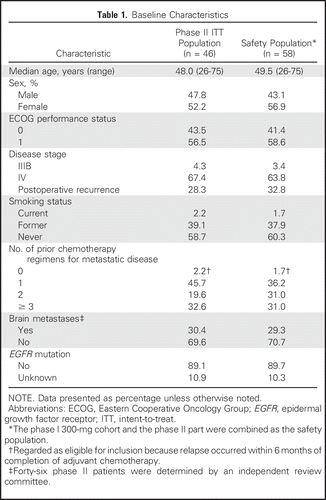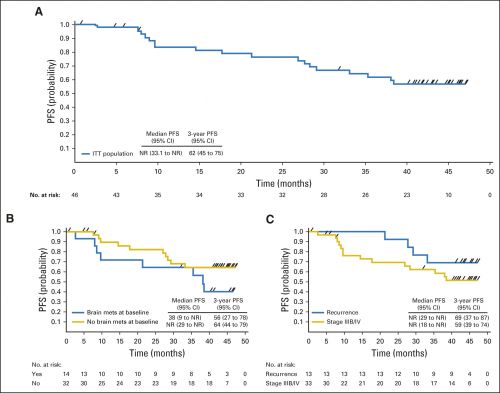4 januari 2026:
Zie ook dit artikel: https://kanker-actueel.nl/alecensa-alectinib-geeft-een-4-jaars-overleving-van-98-procent-voor-patienten-na-operatie-van-niet-kleincellig-longcarcinoom-alk-positief-in-een-vroeg-stadium-blijkt-uit-fase-iii-studie.html
10 april 2017: lees ook dit artikel:
10 april 2017: Bron: Journal of Clinical Oncology
Alectinib, een zogeheten ALK remmer, geeft uitstekende resultaten bij patiënten met vergevorderde niet-kleincellige longkanker en waarbij de ALK mutatie is vastgesteld die al minimaal twee andere behandelingen (chemo) hadden gehad. Uit een groep van 46 patiënten leefde op de drie jaars meting nog 75 procent, waarvan 62 procent zonder ziekteprogressie. Bijzonder aan de resultaten is dat verkleining van de tumor op de scans geen relatie had tot de ziekteprogressie. Er waren dus ook patienten waarbij de tumoren op scnas niet slonken maar die wel na drie jaar nog steeds leefden en geen progressie van hun ziekte hadden.
Alle patiënten hadden vooraf al minimaal twee chemokuren gehad en bij ongeveer een derde waren ook al hersenuitzaaiingen geconstateerd. DAt van zo'n patiëntengroep na drie jaar nog steeds 75 procent leeft is al heel bijzonder maar dat 62 procent geen progressie van hun ziekte hadden si nog veel bijzonderder. Niet heel veel patiënten hebben een ALK mutatie maar als je die wel hebt lijkt Alectinib een uitstekend medicijn.
Aan dit artikel is vele uren gewerkt. Opzoeken, vertalen, op de website plaatsen enz. Als u ons wilt ondersteunen dan kan dat via een al of niet anonieme donatie. Elk bedrag is welkom hoe klein ook. Klik hier als u ons wilt helpen kanker-actueel online te houden. Wij zijn een ANBI organisatie en dus is uw donatie in principe aftrekbaar voor de belasting.
Hier in een aantal grafieken de resultaten uit deze studie. Tekst gaat verder onder de grafieken
Grafiek: Vrije ziekteprogressie overleving en overall overleving
En hieronder zien we dat er ook patienten waren die al uitzaaiingen in de hersenen hadden

Hieronder grafiek van patienten populatie bij start van de studie:

De resultaten van de studie:
At the updated data cutoff (September 10, 2015; first patient in August 30, 2011, last patient in April 18, 2012), 25 of 46 phase II patients were still receiving alectinib. Disease progression was confirmed in 18 patients (39%); median PFS was not reached (3-year PFS rate, 62%; 95% CI, 45 to 75). Fourteen patients had brain metastases at baseline; of these, 6 remained in the study without CNS and systemic progression. Tumor shrinkage and PFS showed no correlation. The 3-year OS rate was 78% (13 events). The most common treatment-related adverse event (all grades) was increased blood bilirubin (36.2%). Most cancer symptoms were relieved early, and medication for symptoms was dramatically decreased during alectinib therapy.
Het volledige studierapport: Three-Year Follow-Up of an Alectinib Phase I/II Study in ALK-Positive Non–Small-Cell Lung Cancer: AF-001JP is gratis in te zien.
Hier het abstract van de studie:
In previously treated patients with ALK-positive NSCLC, 3-year rates were 62% for progression-free survival and 78% for overall survival.
Three-Year Follow-Up of an Alectinib Phase I/II Study in ALK-Positive Non–Small-Cell Lung Cancer: AF-001JP
Tomohide Tamura, St Luke’s International Hospital; Yuichiro Ohe, National Cancer Center Hospital; Hiroshi Kuriki, Tadashi Shimada, and Tomohiro Tanaka, Chugai Pharmaceutical; Kengo Takeuchi, Japanese Foundation for Cancer Research; Makoto Nishio, The Cancer Institute Hospital of the Japanese Foundation for Cancer Research, Tokyo; Katsuyuki Kiura, Okayama University Hospital, Okayama; Takashi Seto, National Kyusyu Cancer Center, Fukuoka; Kazuhiko Nakagawa, Kindai University, Osaka-Sayama; Makoto Maemondo, Miyagi Cancer Center, Natori; Akira Inoue, Tohoku University, Sendai; Toyoaki Hida, Aichi Cancer Center, Nagoya; Hiroshige Yoshioka, Kurashiki Central Hospital, Kurashiki; Masao Harada, Hokkaido Cancer Center, Sapporo; Naoyuki Nogami, National Hospital Organization Shikoku Cancer Center, Matsuyama; and Haruyasu Murakami, Shizuoka Cancer Center, Shizuoka, Japan.
Abstract
Alectinib is an anaplastic lymphoma kinase (ALK) –specific kinase inhibitor that seems to be effective against non–small-cell lung cancer (NSCLC) with a variety of ALK mutations. The primary analysis of AF-001JP reported a promising overall response rate. To assess progression-free survival (PFS) and overall survival (OS), patients from the phase II part of AF-001JP were followed up for approximately 3 years.
Oral alectinib 300 mg was administered twice per day to patients with ALK inhibitor–naïve, ALK-positive NSCLC who had progressed after one or more regimens of previous chemotherapy. In this long-term follow-up, efficacy (PFS, OS), correlation between tumor shrinkage and PFS, safety of alectinib, and relief of cancer symptoms were evaluated.
At the updated data cutoff (September 10, 2015; first patient in August 30, 2011, last patient in April 18, 2012), 25 of 46 phase II patients were still receiving alectinib. Disease progression was confirmed in 18 patients (39%); median PFS was not reached (3-year PFS rate, 62%; 95% CI, 45 to 75). Fourteen patients had brain metastases at baseline; of these, 6 remained in the study without CNS and systemic progression. Tumor shrinkage and PFS showed no correlation. The 3-year OS rate was 78% (13 events). The most common treatment-related adverse event (all grades) was increased blood bilirubin (36.2%). Most cancer symptoms were relieved early, and medication for symptoms was dramatically decreased during alectinib therapy.
Gerelateerde artikelen
- Tyrosine Kinase Remmers (TKR) verbeteren overleving bij patienten met longkanker EGFR positief, verdubbelde overleving bij patienten jonger dan 50 jaar blijkt uit IKLN onderzoek
- Alecensa - Alectinib geeft een 4 jaars overleving van 98 procent voor patiënten na operatie van niet-kleincellig longcarcinoom ALK-positief in een vroeg stadium blijkt uit fase III studie
- Afatinib, een Tyrosine kinase remmer geeft goede resultaten bij longkankerpatiënten met uitzaaiingen in de hersenen in vergelijking met chemo en placebo
- Alectinib geeft uitstekende overall overleving (75 procent) op drie jaars meting bij patienten met vergevorderde niet klein-cellige longkanker met ALK mutatie
- Amivantamab + lazertinib samen geeft bij patienten met niet-kleincellige longkanker met EGFR-mutatie alsnog betere resultaten in vergelijking met osimertinib, ook na resistentie tegen osimertinib
- Crizotinib is superieur aan pemetrexed - Alimta of chemo - docetaxel bij niet-klein-cellige longkanker met ALK positieve genmutatie
- Ensartinib geeft nog betere resultaten op overleving dan crizotinib bij longkankerpatiënten met ALK-positieve expressie. Zowel bij systemische als intracraniële ziektestadium
- Lorlatinib geeft veel langere progressievrije ziekte dan crizotinib bij patiënten met gevorderde uitgezaaide niet-kleincellige longkanker met ALK mutatie
- Osimertinib aanvullend op chemo geeft hele goede resultaten op overall overleving bij patiënten met niet-kleincellige longkanker met EGFR-gemuteerde stadium IB tot IIIA in vergelijking met alleen chemo plus placebo.
- Poziotinib geeft complete respons bij zwaar voorbehandelde patiënt met uitgezaaide niet kleincellige longkanker met EGFR Exon 20 mutatie. Veel andere patienten reageerden ook goed op Poziotinib
- Sotorasib verbetert ziekteprogressievrije tijd versus docetaxel (24 vs 10 procent) bij patiënten met voorbehandelde niet-kleincellige longkanker met KRAS G12C mutatie
- Zongertinib geeft als eerstelijns bij onbehandelde patienten met uitgezaaide niet-klein-cellige longkanker met HER2 positieve expressie uitstekende resultaten
- Tyrosine Kinase remmers (TKI) bij longkanker met EGFR mutaties. Een overzicht van artikelen van verschillende TKI remmers.




Plaats een reactie ...
Reageer op "Alectinib geeft uitstekende overall overleving (75 procent) op drie jaars meting bij patienten met vergevorderde niet klein-cellige longkanker met ALK mutatie"